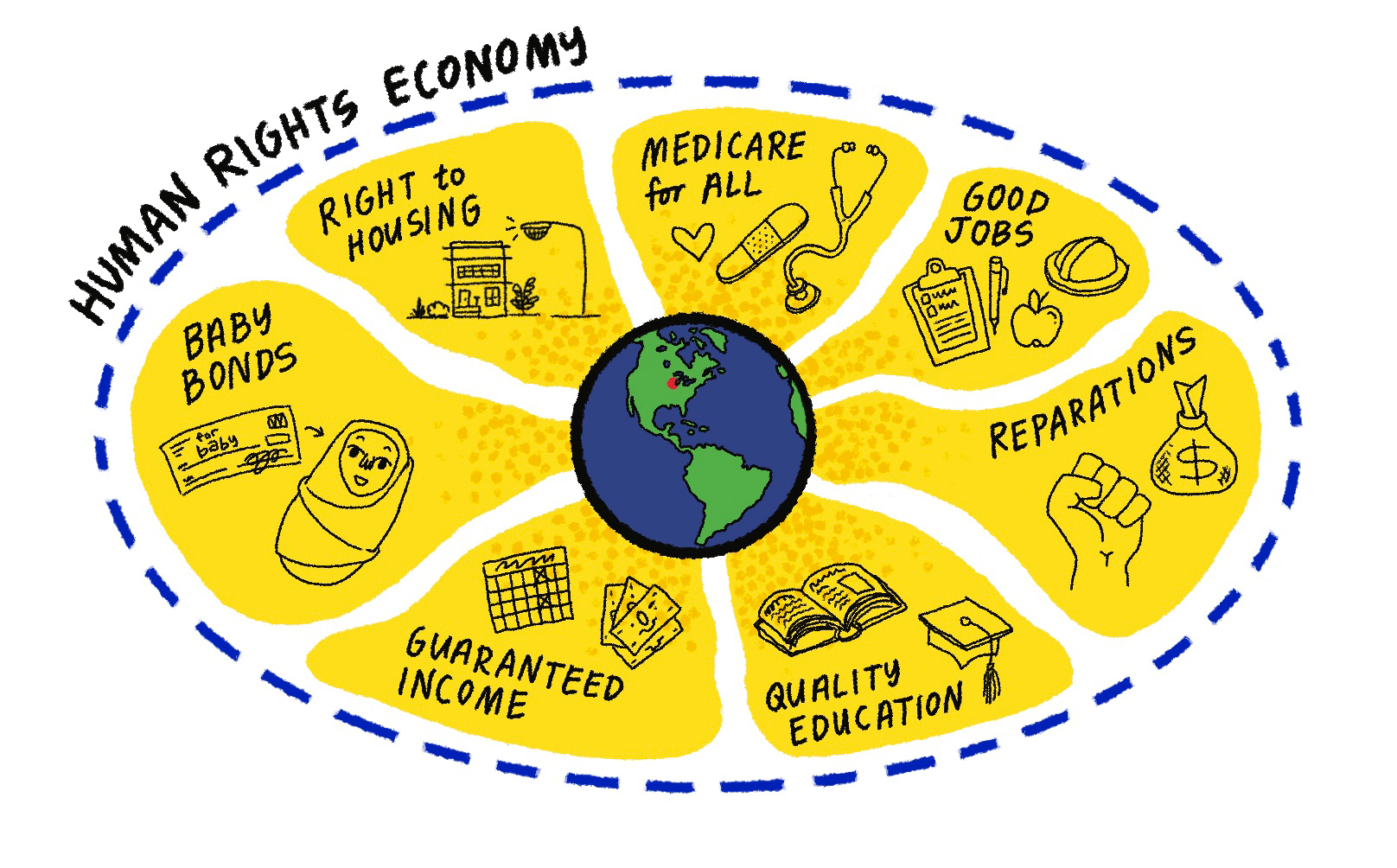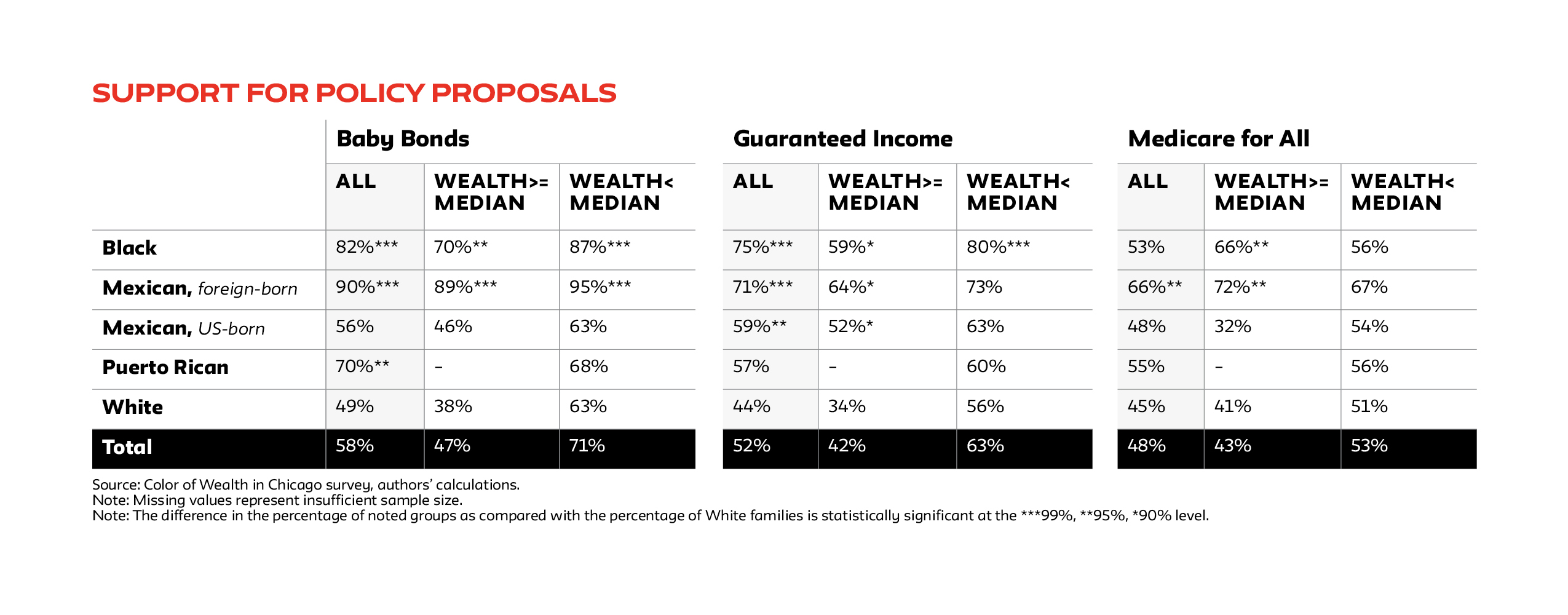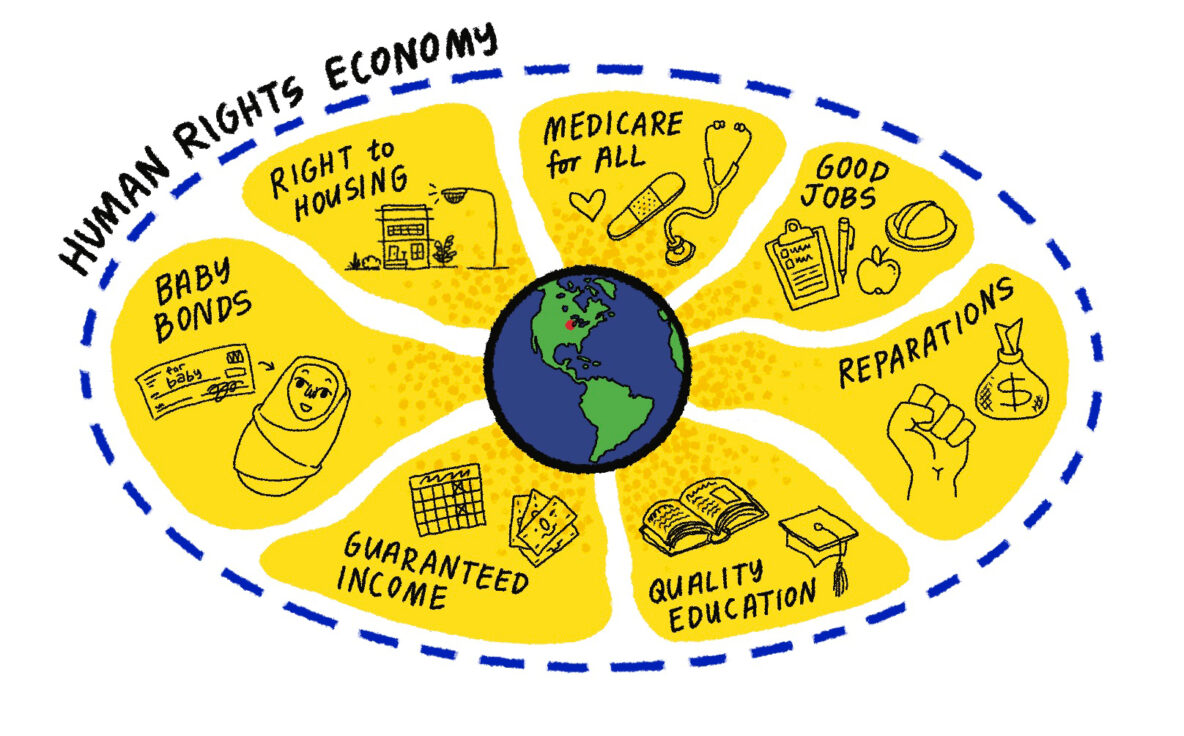By Suparna Bhaskaran, Elaine Chang, and Sam Scipio | October 22, 2024

Baby Bonds are an increasingly popular bipartisan government policy in which every child born into poverty receives a publicly funded trust account at birth, providing them with “start-up capital” to pursue fulfilling, productive, prosperous, and self-directed lives. Follow our Baby Blogs series to learn about the vision, politics, and people behind Baby Bonds and their transformative impact on the lives of young people, their families, communities, and our economy.
In this installment of Baby Blogs, Suparna Bhaskaran, Elaine Chang, and Sam Scipio draw on the Institute’s recent Color of Wealth in Chicago study to showcase public support for Baby Bonds as part of a suite of policies to build a human rights economy.
In June 2024, our team at the Institute released the Color of Wealth in Chicago study. The Chicago metropolitan area is the seventh study in The Color of Wealth series.
In our research, we found that Black Americans in the Chicago region had virtually zero wealth. The median wealth for the entire Chicago region was $122,800, and for White families it was $210,000.
Mexican and Puerto Rican communities also had far less median wealth than White communities and the entire Chicago region. Median wealth for foreign-born Mexican families was $6,000, for Puerto Rican families it was $24,000, and for U.S.-born Mexican families it was $40,500.
Our survey asked respondents about three policy proposals that could lead to greater economic, social, and political inclusion. First, Baby Bonds: a government-funded trust account established at birth, targeted towards babies born into low-resourced families, to be used as an adult as capital to purchase an asset for wealth building purposes; second, guaranteed income: government-funded unconditional cash transfers for low resourced families; and, third, Medicare for All: government guaranteed health care available to everyone.
We then examined the support for all three proposals, not only by race, ethnicity, and nativity, but further stratified by whether the family had high or low wealth.
Our survey questions about Baby Bonds included: “Would you favor or oppose the federal government providing every child at birth a publicly funded trust account, with more generous funding for lower-income families? The money accumulated in the account could later be used by the child to help pay for higher education, housing, or to start a business.”
While all three proposals had strong support, especially among lower-wealth families, Baby Bonds were by far the most popular policy proposal. Importantly, Baby Bonds are an example of policies that recognize equitable wealth building.

Baby Bonds were most favorably supported by foreign-born Mexican families (90 percent) and Black American families (82 percent). This was followed by Puerto Rican families (70 percent), U.S.-born Mexican families (56 percent), and White families (49 percent).
Guaranteed income proposals were most favorably viewed by Black American families (75 percent) and foreign-born Mexican families ( 71 percent). This was followed by U.S.-born Mexican families (59 percent), Puerto Rican families (57 percent), and White families (44 percent).
Lastly, Medicare for All was most favorably viewed by foreign-born Mexican families (66 percent) and Puerto Rican families (55 percent). This was followed by Black American families (53 percent), U.S.-born Mexican families (48 percent), and White families (45 percent).
Policies advocating for Baby Bonds have now been proposed in several U.S. states, have legislatively passed in Washington, D.C. and Connecticut, and continue to grow in momentum. Chicago’s policymakers could consider joining the wave of jurisdictions that are implementing Baby Bonds.
In addition to these three policies, Chicago’s policymakers should strongly commit to complementary efforts that increase access to sustainable homeownership, build equitable entrepreneurial environments, and build a justice system founded on prevention rather than excessive unjust surveillance, policing, and incarceration. Racial inequities in homeownership and home equity are ongoing consequences of a long history of redlining, urban renewal, and extractive financial institutions in the Chicago region. Housing policies need to address the multidimensional aspects of housing inequity: protecting renters from eviction and displacement, producing quality affordable homes, increasing access to sustainable homeownership financing and community wealth-building options like equitable community land trusts, and making public investments that bring services and institutions (e.g., parks, libraries, city services, health centers, quality jobs, energy equity, public colleges, and schools) into racially segregated neighborhoods.
Baby Bonds, guaranteed income, Medicare for All (and reparations programs aimed at redressing the injustices of the past) are not in conflict nor are they redundant. Rather, they fit within a larger vision of what Institute Founding Director Darrick Hamilton has referred to as a “human rights economy,” where people, communities, and the environments in which we inhabit are empowered with essential goods and services to have authentic agency and participate in an inclusive and “fair and moral political economy,” and where social identities (of race, sex and/or nation) are not misused and weaponized to reproduce, cement, and hoard economic and political power for a select few.
Jobs, income, and capital are different dimensions of inequality and well-being and they facilitate one another in a larger concept of the role of governments and finding the particular attributes for which people need resources.
Multiple complementary and simultaneous policies with an eye toward structural and cultural change are vital for building economic, social, and political inclusion not only in Chicago, but all across the United States.
Suparna Bhaskaran is the Director of Research Partnerships at the Institute on Race, Power and Political Economy at The New School and co-author of the Color of Wealth Chicago study.
Elaine Chang is Director of Technological Innovation for Justice at the Institute on Race, Power, and Political Economy at the New School. In her role at the Institute, she applies her training in sociology and experience in tech entrepreneurship to build technologies and develop policies that advance justice. Prior to joining the Institute, Elaine spent a decade building technologies as a product executive. She has worked on batteries for electric cars, crowdfunding mechanisms for grassroots political media, HR software that reduces gender and racial bias, and most recently, a public Covid testing system for millions in California. She has been featured in Forbes, Fortune, Wired, and Bloomberg.
Sam Scipio is the Institute’s Creative Lead. A design generalist at her core, she specializes in visual design, design strategy, graphic facilitation, visual notetaking, branding, and infographics. She is so excited to bring her breadth of knowledge to the Institute to create clear and concise visuals to communicate some of the most pressing and groundbreaking ideas of our time.
If you missed previous installments of our Baby Blogs series, read them here.
To share feedback on this blog, or for questions about Baby Bonds, email David Radcliffe at [email protected].
To learn more, explore our Baby Bonds resources.

